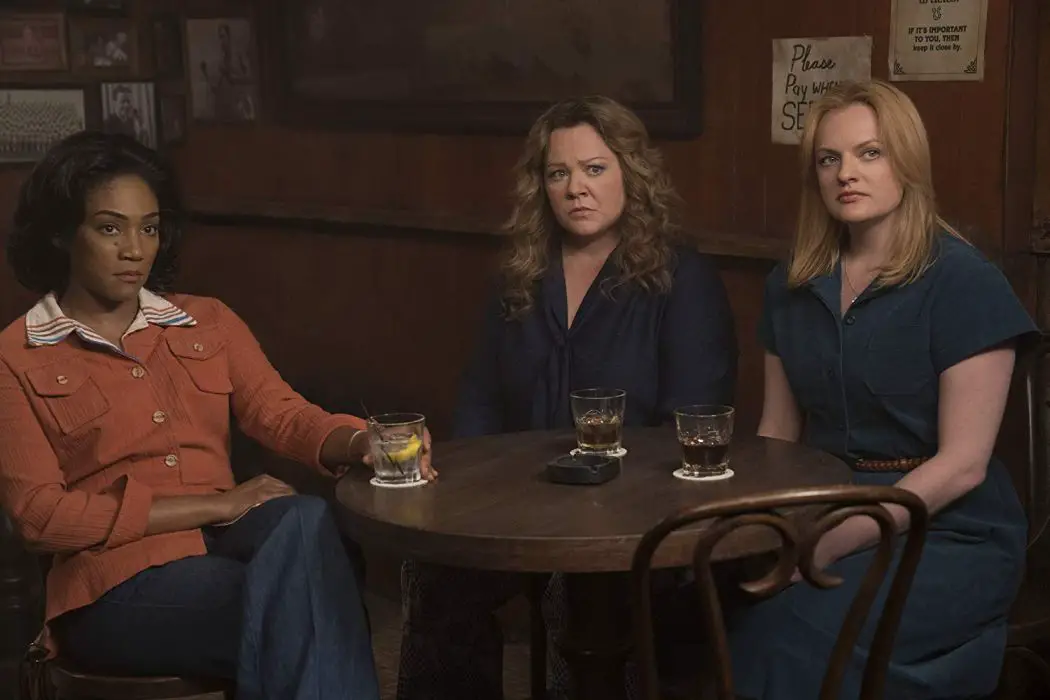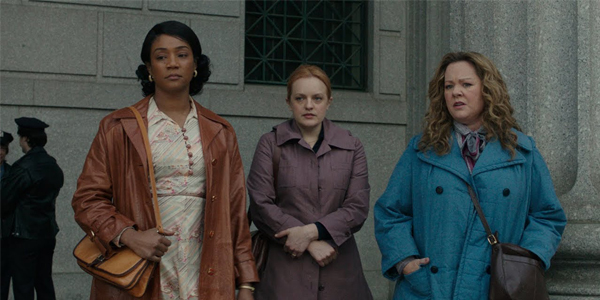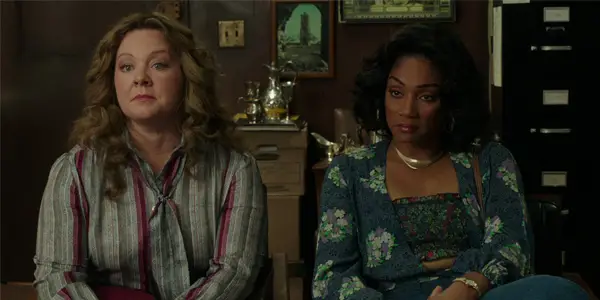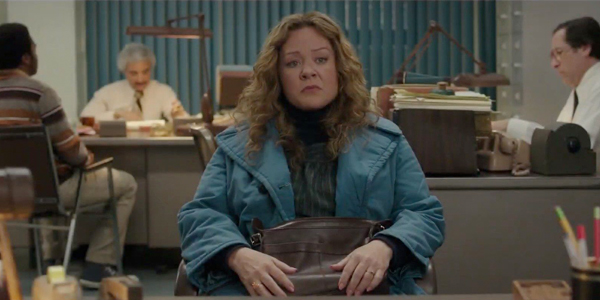THE KITCHEN: Too Many Cooks, Too Few Ingredients

I'm a film journalist and independent filmmaker who fell in…
Coming off the heels of David Sandberg’s critically acclaimed Shazam!, and arriving just before the 2019 Venice Film Festival debut of Todd Phillips’ much-anticipated Joker, The Kitchen is a disappointing entry in the DC Comics cinematic line-up. Forget that it had great potential with an intriguing set-up and an enticing cast of strong performers, the film’s biggest crime is that it seems terribly disposable, mundane and underwhelming. Say what you will about the laser sharks in the abysmal, watered-down Aquaman, but at least the film aimed to do something bombastic and preposterous (even when it fails miserably).
Based on the Vertigo title of the same name by Ollie Masters & Ming Doyle, the film was adapted and directed by Andrea Berloff, Oscar-nominated screenwriter of Straight Outta Compton, but it might as well have been directed by Alan Smithee due to the truly baffling decisions made throughout the film.
The Irish Mob of the Hell’s Kitchen neighbourhood are embroiled in a power struggle after the FBI arrest three gangsters during a robbery. With their husbands locked up in the slammer, Kathy (Melissa McCarthy), Ruby (Tiffany Haddish) and Claire (Elisabeth Moss), find themselves bullied into financial desperation by the new boss, Little Jackie (Myk Watford), who rips off his community instead of dutifully serving them. The trio use trusted mob enforcers to take over the protection racket and earn their community’s respect, which incites an angry Jackie and his syndicate to retaliate.
It’s a Man’s Man’s Man’s World
With Etta James’s rendition of “It’s a Man’s Man’s Man’s World” attempting to establish the tone, the opening montage introduces us to each of the film’s leads, telling us precisely who they are. Kathy worries about her family’s well-being, and her good-hearted husband, Jimmy (Brian d’Arcy James), wants to quit crime for a more honest life; Ruby suffers prejudice from both her entitled, two-timing husband husband, Kevin (James Badge Dale), and his domineering, queen-like mother, Helen (Margo Martindale); and the humble Claire endures physical abuse from her violent-tempered husband, Rob (Jeremy Bobb), which, unfortunately, doesn’t stop once he’s incarcerated.

It isn’t too much of a stretch to compare the film to Steve McQueen’s masterful 2018 heist film, Widows (based on the 1983 television series created by Lydia La Plante). Both films explore themes of class, gender politics & stereotypes, and race, and empower their female protagonists as they challenge the authoritative powers of their discriminatory and misogynistic societies, justifying their use of crime as a means to an end.
In the wake of the #MeToo and Time’s Up movements, the release of both films could not be more timely, with a number of antagonists being condescending, powerful men who are strangers to boundaries; asserting their male dominance over women and have no qualms with resorting to their primal instincts that involve assault, intimidation and/or sexual abuse. In both cases, the villains deeply underestimate our anti-heroines.
It is refreshing to see a comic book adaptation about female character being helmed, scripted and shot by women, with cinematographer Maryse Alberti (who brought grit and intimacy to Darren Aronofsky’s The Wrestler) creating an iconography around the characters whenever possible. The shot of a tortured Elisabeth Moss wielding a gun, for example, is the reason why comic-book imagery is so enigmatic and how its cinematic potential can be realised.
Lacking Depth & Personality
Even while sharing remarkably similar attributes, our three protagonists are never as captivating as those in Widows. Whereas Widows has the strength of its convictions, The Kitchen forcefully spells out every idea and theme, stripping away any genuine character identity, thereby leaving little room for interpretation or nuance. Lacking depth and personality, the characters are reduced to function as one-note vessels, with motivations that are largely ambiguous or simplistic. The journeys taken by our protagonists almost feel like they adhere to a checklist; ensuring that they undergo some sort of transformation by the end, which reflects the paper-thin quality of the screenplay.

Claire, tired of being life’s punching bag, is given an ego boost after being taken under the wing of an enforcer and (subtly named) guardian angel, Gabriel (Domhnall Gleeson), who teaches her to use a gun and clean up after her own mess. This would be fine, except that as the narrative progresses, there isn’t much dimension to their relationship or themselves as individuals, and Gabriel’s motives are schmaltzy and tacky at best. Despite Claire being more of a caricature who exists merely to further the plot, Moss is an arresting screen presence, communicating so much with her body language, eyes and facial expressions, just as she did in her show-stealing performance in Jordan Peele’s Us.
While the no-nonsense Ruby represents the era’s struggles of an African-American woman trying to climb up the hierarchical ladder, her vulnerable side is almost forced into the story, in a flimsy attempt to make her complex (it’s just as impactful as the origin of Ben Grimm’s “It’s Clobberin’ time” in Josh Trank’s 2015 rendition of Fantastic Four, which is not a compliment). Haddish proves that her comedic flair is equally matched by her dramatic chops, but it doesn’t make her character any more compelling. While McCarthy delivers the goods (since the film devotes more attention to Kathy’s plight), her character feels a little wooden and her arc somewhat patchy, which ultimately undermines her performance.
With the exception of Brian d’ Arcy James, who lends some extra mileage to his performance, the supporting cast that portray husbands and gangsters are decent, but their characters are best seen as unmemorable automatons serving the plot. Common gives a solid performance but is absolutely wasted as FBI agent Gary Silvers, who has little bearing on the story and a revelation about his character fails to impress us. It is Bill Camp as Italian Mafioso Alfonso Coretti, who leaves behind a lasting impression; crafting an ominous sense of dread through his commanding demeanour and voice, and exhibiting an uncanny balance of class and seediness.
Annabella Sciorra (whose performance in The Sopranos series is still fondly remembered), brings very little to her brief appearance as Maria (Mrs Alfonso) Coretti, in what could have been an intriguing character; sharing no interaction with Camp, she merely exists to make superfluous lamentations about men who use and abuse her gender (which, let’s be honest, seriously insults the audience’s intelligence). Martindale proves to be one of the highlights of the ensemble, chewing the scenery as she plays “The Baddest Bitch of Hell’s Kitchen”, which, in another time and place, could earn her an Oscar nomination.
While the acting may be the film’s saving grace, it doesn’t help that the dialogue uttered by the cast is terribly perfunctory, ranging from expository to inane. While the film’s message seems to amount to the notion that women can run society without the aid of men (even if certain things in the film were made possible because of certain male characters), the execution of said message is handled in a terribly trite manner. Even the supposedly “badass” final line and shot might illicit groans from your average cynic.
Tonally Uneven
Whether it be the exceptionally laughable Jonah Hex (2010) or Zack Snyder’s terribly misguided Batman V Superman: Dawn of Justice (2016), numerous DC Comics adaptations have fallen into the trap of being cut and tampered by a committee of clueless studio executives, with unnecessary reshoots leaving behind unforgivably mindless results. Berloff seems to be a victim of the classic case of a writer-turned-director having their baby taken from them by the higher powers, and turn it into a bland, laboured entity.

The film’s pacing and rhythm are tediously uneven, with large part due to the strange behaviour of the editing. While credit has been given to Christopher Tellefsen (who cut Widows), it appears to have been edited by an outside party. Some scenes are of a reasonable length but others don’t last long enough and seem to be included only to give us some minor plot detail which might as well have been implied rather than spoon-fed to us. The majority of the film’s scenes are rather weightless; glossed over so quickly that they leave no emotional punch, almost as though the filmmakers were limited to shooting them once.
At times, the film maintains a gritty aesthetic and serious tone that is more line with the films of Martin Scorsese and Paul Schrader (as evidenced by the stylish 1970s-inspired opening credits), but these are quickly contradicted by rather cartoonishly put-together scenes that exhibit a wackiness that belongs in another movie. The montages only further illustrate the film’s secondary desire to be some broad, “feel-good” comedy, but doesn’t even have the laughs to support that its case.
It’s not that the film can’t be funny, but if it has a funny bone in its broken body, then it lacks irony and wit. The film cannot even handle the its dark humour in a mature or sensible fashion, and is quite vague about how to handle its overall use of violence. Even a scene with a corpse seems rather indecisive on how it should play, when it would otherwise ooze with dark humour in a film by Alfred Hitchc*ck or the Coen Brothers. Even though some moments create some effective drama, it is all the more frustrating that The Kitchen wants to be a serious film with dark comedy, or a comedy with violent elements.
Whether it is down to Berloff or other entities, The Kitchen is not a film that appreciates or understands cinematic language, especially when some of its better scenes are more action-oriented and do away with dialogue. Despite not knowing what the original cut could have looked like, the film already feels like a distorted shadow of its former self.
The Kitchen: Conclusion
Even with a few decent set-pieces and exceptional acting from the ensemble, The Kitchen is not the adaptation we deserve; neither does it capture anything significant from a feminist perspective, nor does it match the gusto or intrigue of the 1970s American crime films it tries to emulate. Worse yet, it doesn’t reflect the artful and edgy sophistication that the (soon to be discontinued) DC Vertigo imprint boasted since it was founded by Karen Berger.
At the time of writing, the hype surrounding the upcoming Joker (supposedly) promises a film that will capture the essence of gothic & noirish comic books, in addition to classic, hardcore Scorsese films. It may be too early to say, but there could be hope for dark, thoughtful DC Comics adaptations to hit cinemas again, ones that could mop up the mess left behind by misfires like The Kitchen.
Watch The Kitchen
Does content like this matter to you?
Become a Member and support film journalism. Unlock access to all of Film Inquiry`s great articles. Join a community of like-minded readers who are passionate about cinema - get access to our private members Network, give back to independent filmmakers, and more.
I'm a film journalist and independent filmmaker who fell in love with cinema at a young age. I also love writing about comics, literature, podcasts, television and video games. I'm just as content watching a movie about a giant killer pig terrorising the Australian outback as I am with one that features a catholic priest in crisis.













